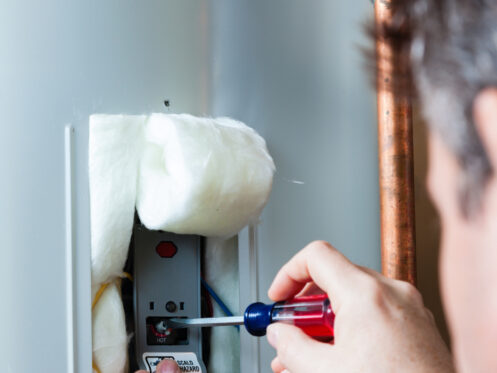As the temperatures drop from the approaching winter, homeowners face concerns about the vulnerability of their home appliances to the cold. One appliance that might be overlooked is the water heater. Most people think that water heaters are not prone to freezing. But how true is this? Can your water heater freeze during winter?
By being proactive, you can protect your water heater from potential damage associated with freezing temperatures. This article discusses why water heaters can freeze in the cold and the possible preventive measures to ensure your water heater functions efficiently even in freezing temperatures.
Understanding the Risks
Most water heaters have a built-in freeze protection feature that works even when the temperatures fall between -5- and -22 degrees Fahrenheit. But what if your water heater doesn’t have that feature? It is thus vital to be aware of the conditions that make a water heater vulnerable to low temperatures. Several factors make your water heater prone to freezing under low temperatures.
Exposed Pipes
Exposed water pipes are more vulnerable to freezing as the temperatures plunge. When the temperatures go very low, the water inside can turn into ice, leading to pipe expansion and potential bursting. This risk is worse in areas like Philadelphia, where the temperatures go to extremely low levels. When exposed to cold air, exposed pipes will lose heat very quickly. The water heaters connected to the exposed pipes will likely be affected as the frozen pipes disrupt water flow into the heater.
Poor Insulation
The level of insulation around the water heater plays a vital role in strengthening its resilience against freezing. Standard insulation is likely to be inadequate in areas with extremely low temperatures. Poor insulation increases the possibility of a water heater freezing by allowing heat seepage from the pipes and the heater. This heat loss makes it challenging for the water heater to maintain a consistent temperature. As a result, the water within the pipes will cool down, and the risk of freezing and possible bursting increases.
Extended Power Outages
Extended power outages are common during winter storms. This poses a significant risk to water heaters. Water heaters cannot function without electricity, resulting in a lack of hot water. As the water within the system cools down, the pipes and water heater are left at an increased risk of freezing.
Location Matters
The location of the water heater plays a crucial role in whether it will withstand low temperatures. If installed in an unheated space such as a garage, attic, crawlspace, or poorly insulated basement, the likelihood of the water heater freezing is higher. In these spaces, the temperature can drop significantly during the cold weather, exposing the water heater and the connected pipes to freezing.
Practical Measures to Prevent Freezing
Winterizing a water heater involves proactively protecting it from the potential damage caused by extremely low temperatures. It consists of a series of steps that go beyond mere maintenance. Winterizing is a strategic investment that aims to extend your water heater’s lifespan and its efficiency at utilizing energy and delivering desired results.
Insulation
It’s imperative to insulate both the water heater and the pipes. Proper insulation is crucial to creating a barrier that helps retain heat. An insulation blanket can be used to wrap the water heater tank and pipes to minimize heat loss and prevent the possibility of freezing. Common insulating materials include fiberglass or foam. Consider an insulating material that has a high R-value for effective insulation.
Heat Tape or Cable
Heat tapes or cables are valuable tools for preventing the freezing of water heaters and pipes in cold weather. They are designed to provide a controlled amount of heat to the surface they are applied on to prevent them from reaching freezing temperatures. They are of two types: self-regulating, which adjusts the heat output depending on environmental temperature, and non-self-regulating, which provides constant heat throughout.
Location
The location of the water heater is a crucial way to prevent water heaters from freezing. Strategic placement of the appliance can mitigate the risk of a cold weather-related issue. Install the water heater indoors in a heated space, such as the utility room, or enclosed space, such as a closet, to protect against cold air. If you must place the water heater outside, consider installing it in a sheltered space, away from direct exposure to harsh weather.
Sealing Gaps and Openings
Sealing the gaps and openings surrounding the water heater is an effective solution to prevent freezing. You can prevent cold air infiltration by filling gaps around windows and in walls. Apply weather stripping around doors to create a tight seal that will prevent the entry of cold air. Additionally, you can use caulking to seal parts where pipes or wires enter the room.
Backup Power
Using backup power is an effective winterizing method. Install a backup generator to provide electricity during the occurrence of power outages. This will ensure that the water heaters continue working and prevent freezing.
Consider installing an automatic transfer switch for a seamless transition. The automatic switch will detect the power outage and instantly switch on the generator. We can help you select and install a generator with sufficient capacity to power your entire home during the outage. Alternatively, portable generators are a cost-effective solution for smaller water heating systems.
Drain the System
Draining the entire system is an effective way of preventing freezing, especially for appliances in properties that are unused for long periods during the winter. This practice involves turning off the water supply at the main water shut-off valve and opening all faucets, including the hot- and cold-water taps, to release pressure and allow water to flow out. Doing so ensures that no water remains in the system. You can connect a hose to the water heater’s base and open the valve to drain the water completely.
Water Heater Freeze During Winter: Maintain a Constant Temperature
Ensuring a constant temperature is a proactive approach to preventing the water heater from freezing. In addition to providing adequate insulation as outlined above, you can ensure even temperatures by setting the thermostat properly to provide adequate warmth. Setting additional thermometers near the water heater and regularly monitoring it will ensure you keep the environment temperature at acceptable levels.
Dream Team Home Services is a reliable HVAC company serving Media, Philadelphia, and the surrounding areas. For more than 20 years, we have provided our clients with unparalleled HVAC, plumbing, and electrical services. We can often offer same-day service in emergency situations.
We have a team of highly trained technicians, excellent customer service representatives, and managers who work around the clock to ensure our customers’ satisfaction. You can trust us whether you need a system installation, repair, or regular tune-up. We are the go-to team for major plumbing repairs or minor faucet fixes. Contact Dream Team Home Services today for all your HVAC concerns, including system performance, indoor air quality, or efficiency.



